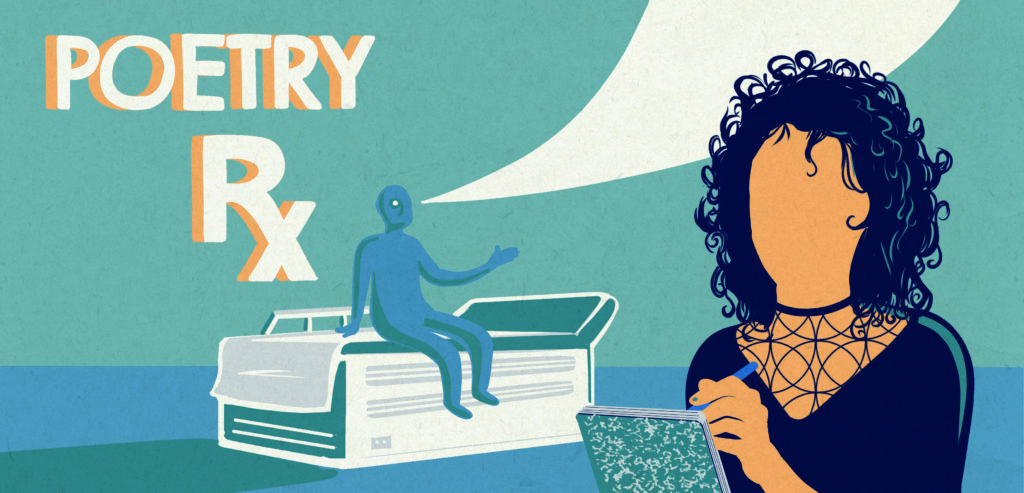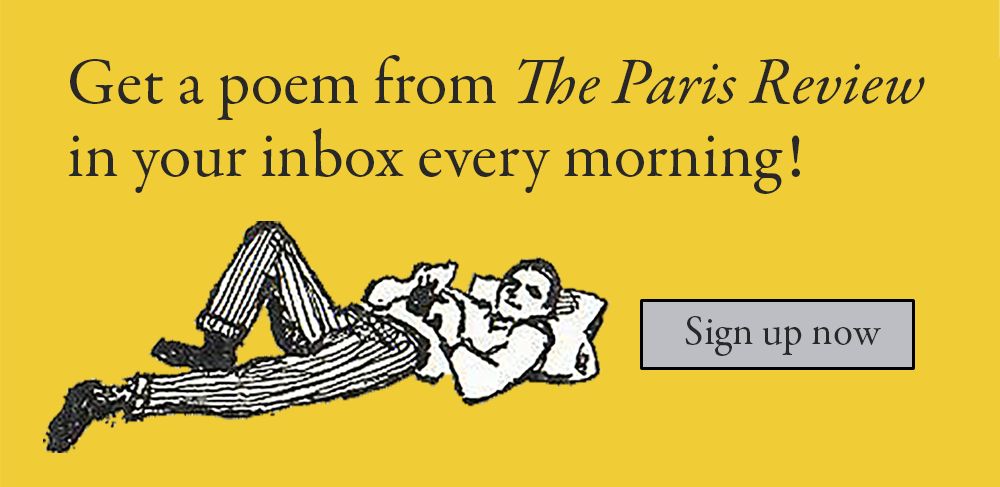In our column Poetry Rx, readers write in with a specific emotion and our resident poets—Sarah Kay, Kaveh Akbar, and Claire Schwartz—take turns prescribing the perfect poems to match. This week, Claire Schwartz is on the line.
Dear Poets,
What do you do when the person you thought would be your best friend forever and ever and ever no longer feels the same way? Or perhaps never even did? Is it just time to move on? What do you when you’ve promised yourself, and her, that you would love her forever and ever, no matter what? Was that a ridiculous promise?
Thank you,
Lost
Dear Lost,
I’m sorry that you’re experiencing this heartbreak. It is both an exquisiteness and a challenge that friendship is not governed by the regulation of other relationships. Friendship is not afforded the same social (or legal) recognition as blood ties or romantic partnerships. How we love our friends has few rules, and that means we get to be gorgeously creative with that love. It also means that how we work through conflict—how and if and when friendships end—has few models. In my experience, this confusion has made the end of close friendships all the more painful. For you, “Poem” by Langston Hughes, which cuts through the haze to say it plain:
I loved my friend.
He went away from me.
There’s nothing more to say.
The poem ends,
Soft as it began—
I loved my friend.
I memorized this poem the first time I read it. It lives in my body as completely as heartbreak. Its simplicity feels incontrovertible: “I loved my friend / He went away from me.” Its title—simply, “Poem”—reminds me how pain spreads. What other story, in this moment of heartbreak, could a poem tell? The tiny form of this poem met the formlessness of my grief—it offered me something to hold so that I was less held by my own hurt. I hope it offers you some relief, too.
You promised to be her friend forever. Sometimes forever isn’t a measure of time. When you made that forever-promise, you lived in a moment so full it offered you a perch to glimpse the rest of your lives. That is a gift. But, as James Baldwin writes: “For nothing is fixed, forever and forever and forever…” Things change. Change is a condition of loss. It is also a condition of growth. You deserve to pour into those who would pour into you, to carry forward your capacity to love towards those who will love you well back.
—CS
*
Poets,
I need a poem for courage. I have ambitions to become a great artist, but I am afraid that my art will not be well-received. The thought of that mortally wounds me and sometimes prevents me from putting my work out there. I have an intense fear of failure, and I know I need to get over that in order to get anywhere. Do you have a poem that speaks to overcoming your deepest fears and being brave enough to bare your vulnerable side to the world?
Sincerely,
Fearing Failure
Dear Fearing Failure,
I do have a poem I’d like to share with you. It’s not a poem of courage, but it is a poem of purpose. Elizabeth Alexander—who, as well as being a magnificent poet, was also my beloved professor—taught me that fear can be a form of ego because, like hubris or arrogance, fear amplifies the size of the self. It puts the self between the self and the task at hand. Fear diminishes focus. For you, Elizabeth Alexander’s “Ars Poetica #100: I Believe”:
Poetry (and now my voice is rising)
is not all love, love, love,
and I’m sorry the dog diedPoetry (here I hear myself loudest)
is the human voice,
and are we not of interest to each other?
I love the ars poetica—a poem that makes a claim about what poetry does—because it dares to articulate its purpose, which is to say: it risks failure. But failure focuses on the self. Purpose, on the other hand, reminds you that your art connects you to something greater. With purpose, the work, not the self, is the site of your attention.
You write that you want “to become a great artist.” What pressure! History is brimming with unrecognized greatness. You can’t control your reception. Instead of thinking about how your work will serve your reputation, think about how you can serve the work. Aim to make great art. What defines greatness is not what the world says, but how well your art serves what you believe. I read Alexander’s “my voice is rising” foremost as a description of clarity, and only second of volume. It shows me something about what I want to serve. Ask yourself: “What do I believe? How can my work serve that?” The why of your art will sustain your making.
—CS
*
Dear Poets,
Life has gone astray and I am considering faith again in its many forms. I identify as nonbinary, and I’m having trouble reconciling the validity of any binary. I feel a reluctance to believe in something because it is inherently good or bad, but I want to have faith in something. How do you define faith? Can you point me to a faith-defining poem?
Sincerely,
Seeker
Dear Seeker,
If we understand something to be only good or only bad—only one thing and definitively not that other thing—our belief in that thing will quickly crumble. Or, more dangerously, we will wish to harm anything that threatens to expose the binary’s fallacy. A stable faith can’t be found in evangelical certainty. Faith is what steadies you to move into the unknown.
I want to offer you Kevin Young’s “Obsequies” from his gorgeous collection The Book of Hours:
doubt keeps a kind
of faith, is belief
without a wordfor what
it knows—plenty
for what we don’t
I love this conception of faith as loyalty to doubt, this reminder of the entanglement between believing and not knowing.
Poetry is faith work for me, a practice of being with the unknown. As C. D. Wright writes: “[Poetry postulates] an inquiry extended along the lengths of the lines of knowing and beyond the tips of the known.” In poems, the end of each line casts me into space. When I come back to meaning, I come back slightly estranged from what I knew before, open(ed) to another way. The nonbinary—the thing that misaligns you from uncomplicated belief—may be precisely what leads you to wonder. Young writes:
at night I count
not the stars
but the dark
And I think here is one definition of faith: that disjuncture between our tools for understanding and that which we give our attention. Attention is faith’s form. It grants that there might be something worthy there.
You already have faith. Your seeking is its trace. What you need now is a ritual—reading, writing, running, drawing, cooking—that can give form to it and move you deeper into the seeking you’ve already begun.
—CS
Want more? Read earlier installments of Poetry Rx. Need a poem? Write to us! Next week, Kaveh Akbar will be answering questions.
Claire Schwartz is the author of bound (Button Poetry, 2018). Her poetry has appeared in Apogee, Bennington Review, The Massachusetts Review, and Prairie Schooner, and her essays, reviews, and interviews have appeared in The Iowa Review, Los Angeles Review of Books, Virginia Quarterly Review, and elsewhere.
from The Paris Review https://ift.tt/2L96g9f


Comments
Post a Comment